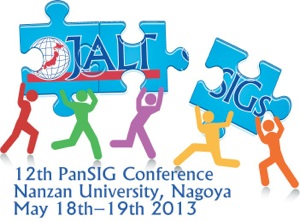The JALT Vocabulary SIG Symposium
I was lucky enough to be able to attend this year’s JALT Vocabulary SIG Symposium on Saturday in Fukuoka. It was the first time for me to attend the event, and I found it useful enough to put it on my list to attend next year.
The format for the symposium was to have two sessions, one in the morning and one in the afternoon, with a poster session/lunch in between. Each session consisted of four twenty-minute presentations of research followed by comments from a discussant (this year Paul Nation and Yo In’nami served in this role).
Apart from the fact that it was held in Fukoka, which has the most convenient airport (5 minutes by subway from the central train station) and possibly the best ramen in Japan, the symposium had several other things going for it:
- the quality of presentations was high
- having a discussant comment on the research papers gave powerful insight into how to approach research
- having the entire symposium in one room allowed all the participants to have the same experience
- the venue was conveniently located ten minutes by subway from the city centre
- the organization was very smooth, with signs and volunteer guides, coffee sessions, and a well-organized poster session
Basically I was very impressed and recommend future Vocabulary SIG events -hope to see you at one in the future!
conference extensive reading graded readers Language learning presentations Reading
by sendaiben
4 comments
Readability (and the lack of it) in graded readers
At the JALT Pan-SIG conference a few weeks ago (my favourite conference in Japan) I attended two extremely thought-provoking lectures, back to back. Both of them were talking about something very similar, something that has also been coming up in conversations with students this week.
The topic was readability of graded readers, or why some books are easier to read than others.
Marcos Benevides has a great blog post outlining the content of his talk. It’s well worth taking a few minutes to read that now.
Amanda Gillis-Furutaka, from Kyoto Sangyo University, talked about her fascinating research into the specific problems students have when reading English text. Her findings were echoed by my students when I talked to them about their reading in extensive reading classes this week. If you have the chance to attend one of her presentations on this topic at JALT or elsewhere, please consider doing so.
So what makes books difficult for students (focusing on students reading texts up to around 1000 headwords, ie beginner to lower-intermediate readers)? In short, the following:
-number of characters (the more characters the harder it is to understand the story)
-the complexity of the language (modal verbs and allegory are a real barrier to understanding)
-literary devices such as changing between different perspectives, changing from the present to the past suddenly, or unexpected plot twists
While these insights are perhaps most useful to authors and publishers, they can also help teachers recommend books for students (and know which books to put off until later!). Really interesting stuff, and I’m looking forward to reading Ms Gillis-Furutaka’s research when she publishes it.
conference curriculum expectations extensive reading graded readers language courses presentations school management university
by sendaiben
5 comments
Student Reactions to Extensive Reading (Pan-SIG 2013)
I was at the Pan-SIG conference this weekend, held in Nagoya (the excellent Nanzan University hosted the event). This is the video of my presentation (a little shorter than usual):
Thanks to everyone who attended.
JALT Pan-SIG 2013 @ Nanzan University in Nagoya: May 18-19
I’ll be attending and presenting at one of my favourite conferences, the JALT Pan-SIG, this weekend.
I love the pan-SIG because it is a gathering of teachers that belong to special-interest groups (the SIGs) that focus on things they are passionate about. The quality of the presentations and interactions at pan-SIG is always very high, and I always come away with new information, techniques, and memories.
I’ll be presenting on Saturday at 14:30, on student reactions to extensive reading classes.
Hope to see a lot of you there!
conference evaluation expectations presentations public policy teaching TED
by sendaiben
leave a comment
Ken Robinson’s latest talk
Ken Robinson, the most popular speaker on the TED website, and someone who talks about education to boot. I’m guessing many of my readers have seen this talk already, but just in case I’m putting it on here.
Ken Robinson is one of my favourite speakers. He is incredibly skilled. Notice how he speaks for 20 minutes in the video above, with no notes, no slides, nothing to support him, and still manages to be compelling and stay on track. I can only imagine the hours of practice that went into that one off-the-cuff seeming talk.
This particular talk struck a chord because it seems to go against everything I’m working on at the moment in terms of setting standards and expectations at my university. However, once I thought about it, our programs involve setting expectations but then giving students a lot of leeway as to how they meet them (which books they choose to read, how they talk about articles, which websites they choose to use). We don’t expect the same from all students, but we expect all students to put in similar amounts of time and effort (or understand the consequences of not doing so).
Having watched the talk, do you see any connection to your own teaching practice?

